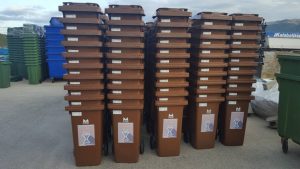Biowaste management- a good example to reduce landfill waste
Volumes of waste today are increasing in line with economic growth. Landfill waste poses a huge problem first of all, as it has economic and environmental impact and secondly, due to slow decomposition rate which takes thousands of years. Furthermore, several acres of land have already been virtually rendered useless that could have been actually used for setting up new residential colonies or industries. Reduce; Reuse and Recycle are most common methods to reduce landfill waste.
The current project (Less Waste II) deals with biowaste and especially food waste from households. Supply of biowaste bins have already distributed among citizens in Municipalities of Grevena and Kastoria (bins with a capacity of 120lt and 240 lt for the cities and a smaller of 10lt for the households, but also home composting bins of 330lt). Moreover, Municipalities have also received a special vehicle for the transportation of the bins to the citizens, useful in case of malfunction and for the daily monitoring of biowaste management.
Home composting is an easy and natural process that takes remains of household waste and green waste (remains of plants etc.) and turns them into fertilizer rich in nutrient and usable in cultivation. Another method to make good use of biowaste, is energy utilization through the incineration of waste. The energy generated incineration becomes heat and to some extend electricity. Thus, by energy recovery from biowaste less harmful emissions would be added in the atmosphere. These two good practices of biowaste management are essential if in the pursuit of sustainable development.
Disclaimer
The views expressed in this publication do not necessarily reflect the views of the European Union, the participating countries and the Managing Authority.

